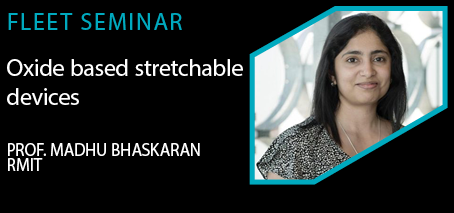-
3 May 2019
10:00 am - 11:00 am
Prof Madhu Bhaskaran
Functional Materials and Microsystems, RMIT University
All welcome! The seminar flyer can be downloaded clicking on this link
Oxide based stretchable devices
Abstract:
Electronics and sensors pervade all aspects of life, needing solutions to make them less obtrusive, which is where fully transparent electronics come into play. Our research focus has been to realise stretchable electronic devices with highly functional characteristics while being optically transparent. All electronic devices rely on oxide materials – these are in the form of ultra-thin coatings, often prepared at high temperatures. Integration of multifunctional oxide thin layers in flexible devices would create enhanced functionality and performance. This integration has been limited by the brittle nature of oxides and high temperature processing requirements.
Our research has addressed this key bottleneck with a ubiquitous transfer process. This process utilised the naturally weak adhesion of platinum to silicon, and this allows us to create electronics on a rigid substrate such as silicon and then peel off the layers to transfer onto a flexible substrate. This process also results in a unique ‘micro-tectonic’ surface, creating opportunities to explore new stretchable device applications. This process has been successfully demonstrated using transparent indium tin oxide, zinc oxide thin films, and titanium dioxide thin films with stretchability of up to 15% which is exceptionally high for a brittle oxide. With this process, we have also demonstrated room temperature gas and UV sensors, mechanically tunable diffraction gratings as well as optical metasurfaces.
This process allows the creation of transparent stretchable electronics with nanometre resolution as well as large-area functional devices without the need of tailoring the production process to the design.
BIO
Professor Madhu Bhaskaran co-leads the Functional Materials and Microsystems Research Group at RMIT University. She has won several awards and fellowships for her research including competitive Australian Research Council Postdoctoral Fellowship (2010-2014) and Australian Research Council DECRA Fellowship (2016-2018). She has been named as one of Top 10 Innovators under 35 for Asia (MIT Technology Review 2016). She has also been recognised with the Eureka Prize for Outstanding Early Career Researcher, Batterham Medal, and APEC Aspire Prize. Her research interests include functional oxide thin films, wearable technologies and stretchable electronics.
Venue: G59-G60, Old Main Building K15
Address:

